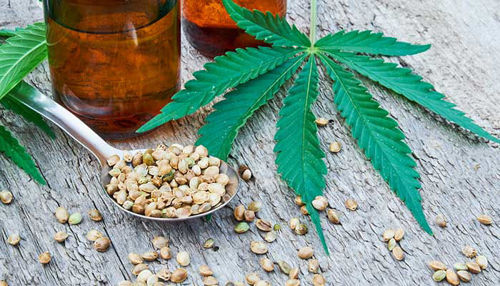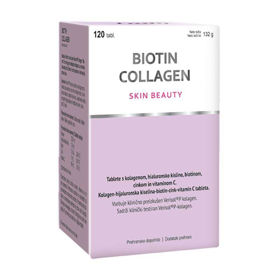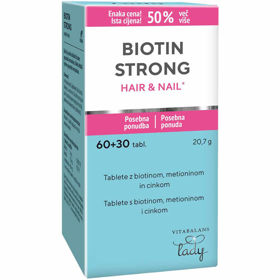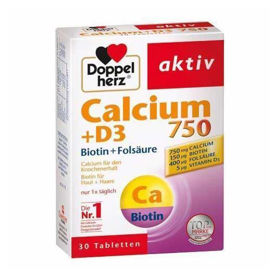Biotin (vitamin B7) is a B complex vitamin that plays a crucial role in converting food ingredients into energy and supports skin, nails, and hair health.
Biotin: General | Biotin for hair, nails and skin | Shortage | Dosing | Foods with biotin | Side Effects, Interactions and Safety | Questions and Answers | Sources/references
The B vitamin complex is a group of critical nutrients necessary for healthy metabolism, nervous system, digestion, and cardiovascular function. Vitamins of the B group are found in various foods, so most people get the recommended amounts from their diet.
The word "biotin" comes from the ancient Greek word "biotos," which means "life" or "survival." Biotin is also considered an essential nutrient during pregnancy, vital for fetal growth. In addition, B vitamins promote healthy brain function.
Image: nutritional supplements are available in various forms and formulations.

Biotin acts as a coenzyme in the body, which is necessary to metabolize fatty acids, amino acids, and glucose. This means that when we eat foods that are a source of fat, protein, and carbohydrates, biotin – also called vitamin B7 – must be present to convert and use these macronutrients.
More specifically, biotin is involved in:
- Fatty acid syntheses: biotin helps enzymes that activate reactions necessary for producing fatty acids.
- Amino acid breakdown: biotin-containing enzymes metabolize several critical amino acids, including leucine.
- Gluconeogenesis is the synthesis of glucose from sources other than carbohydrates, such as amino acids and enzymes that contain biotin, and thus helps initiate this production process.
Video content: benefits of consuming biotin.

The benefits of biotin are also shown to help with a youthful and attractive appearance, as this vitamin plays a vital role in maintaining the health of hair, nails, and skin. Sometimes because of this role, it gets the nickname vitamin "H." This comes from the German words Haar and Haut, meaning "hair and skin."
Biotin products have recently become a trend among consumers who want longer and healthier hair and nails. Suppose you want to take a biotin supplement. In that case, you have several options, such as biotin pills, biotin vitamins that include other B vitamins, biotin-containing skin care serums and lotions, and biotin shampoos.
Vitamin B7 can also be found as part of B-complex nutritional supplements, which include the full spectrum of B vitamins, including vitamin B6, vitamin B12, vitamin B2 riboflavin, and vitamin B3 niacin. Vitamins work synergistically, so taking B vitamins together is always the best way to ensure the best results.
Biotin for hair, nails, and skin
Thinning of hair is one of the symptoms associated with biotin deficiency. In addition, vitamin B7 is often added to beauty products for hair and skin, although it is believed that it is not well absorbed through the skin. You benefit most from consuming it from food sources (such as B vitamin foods) or supplements.
Image: biotin supports the production of proteins and enzymes necessary for hair growth.

Biotin deficiency can also cause brittle nails. For people with this deficiency, taking supplements containing biotin may improve the strength of their nails. Biotin is a versatile addition to your beauty routine, as it can strengthen nails and accelerate their growth.
Taking a biotin supplement can help correct a deficiency of this vitamin and support the production of proteins and enzymes necessary for hair growth. Enzymes responsible for the health of hair, skin, and nails depend on it, and it also stimulates the synthesis of keratin. AsstBiotin deficiency can therefore cause thinning and weakening of the hair and scalp.
Remember that deficiencies in other nutrients such as zinc, selenium, and iron can also contribute to thinning hair, and several medical conditions, such as hormonal imbalances/endocrine disorders, can also be to blame.< /p>
Biotin deficiency
Biotin deficiency is rare but can occur. Dry skin, brittle hair or hair loss, lack of energy or chronic fatigue, and digestive and intestinal problems are some signs to look out for. Symptoms of biotin deficiency begin gradually and may intensify over time.
Biotin deficiency symptoms may include:
- epileptic seizures
- skin infections
- fragility of nails
- neurological problems such as depression, lethargy, hallucinations, and paresthesias (tingling) in the limbs
Image: symptoms of biotin deficiency start gradually and may intensify over time.

Some causes of biotin deficiency include:
- pregnancy
- long-term use of certain drugs
- problems with intestinal malabsorption or severe digestive disorders such as Crohn's disease, celiac disease, or leaky gut syndrome
- long-term use of antibiotics
- excessive use of alcohol
- eating lots of raw egg whites
- smoking
Most healthy adults meet their biotin needs through a well-balanced diet. However, noten supplement form, standard doses of biotin range from 1,000 micrograms to 10,000 micrograms, much higher than your daily recommended requirement or amount.
While biotin deficiency symptoms may disappear with medical help, a person may need to take biotin for the rest of their life. So if you suspect a lack of biotin in your body, it makes sense to talk to your doctor before taking a supplement.
Dosage
For adults 19 years of age and older, the recommended daily amount of biotin is 30 mcg.
Image: nutritional supplements must be taken according to the guidelines, taking into account the recommended daily intake.

At this dose, biotin supports all the basic needs that your body needs biotin for, such as the metabolism of carbohydrates, proteins, and fats.
Table of recommended daily values according to gender, age, and period of life:
| age | male | female | pregnancy | breastfeeding |
| up to 6 months | Five mcg | Five mcg | ||
| 7-12 months | Six mcg | Six mcg | ||
| 1-3 years | Eight mcg | Eight mcg | ||
| 4-8 years | 12 mcg | 12 mcg | ||
| 9-13 years | 20 mcg | 20 mcg | ||
| 14-18 years | 25 mcg | 25 mcg | 35 mcg | 35 mcg |
| 19+ years | 30 mcg | 30 mcg | 30 mcg | 35 mcg |
In which foods is biotin found?
It is always best to get your nutrients from natural sources. However, your doctor may suggest a supplement if you can't get enough biotin naturally.
Yolks
Eggs are rich in B vitamins, protein, iron, and phosphorus. In addition, one egg contains more than a third of the recommended daily dose of biotin. Eggs can be scrambled, poached, fried, or hard-boiled. Add an egg to your salad, or try it as a snack - endless possibilities.
Image: a balanced and organic diet is the best source of biotin.

Biotin content in a boiled egg (50 g): 10 mcg.
Sweet potatoes
Sweet potatoes are rich in vitamins, minerals, fiber, and carotenoid antioxidants. According to plant sources of biotin, sweet potatoes rank at the very top. Sweet potatoes can be boiled or baked. Sweet potato, or shakar gundi, is a delicious winter food.
Biotin content in sweet potatoes (125 g): 2.4 mcg.
Mushrooms
Mushrooms are rich in critical nutrients and offer many health benefits. In addition to being an excellent source of biotin, they are also rich in antioxidants and minerals. Moreover, due to the high concentration of biotin, they are protected against parasites and such pests.
Biotin content in fresh mushrooms (70 g): 5.6 mcg.
Spinach
Spinach is also an excellent source of biotin. In addition, it is also a rich source of vitamin A, vitamin C, calcium, iron, and folic acid. Raw spinach is high in fiber, but cooked spinach can provide more beta-carotene. Three times more beta-carotene – an antioxidant that is a form of vitamin A – is absorbed from cooked spinach compared to raw spinach.
Video Content: Top 5 Best Healthy Food Sources of Biotin or Vitamin B7.

Biotin content in cooked spinach (64 g): 5 mcg.
Legumes
Peas, beans, and lentils are legumes rich in protein, fiber, and minerals. In addition, peanuts and soybeans are two of the richest sources of biotin in this category. Legumes are usually cooked and added to boiled or baked dishes or used as a base for starters, curries, and salads.
Biotin content in roasted peanuts (100 g): 19.3 mcg.
Seafood
Regarding seafood, salmon and tuna have the most biotin. Both also contain healthy and highly beneficial omega three fatty acids. Combine this delicious food with a salad or brown rice for an easy dinner.
Biotin content in cooked salmon (85 g): 5 mcg.
Sunflower seeds
Sunflower seeds contain biotin and other micronutrients such as calcium, potassium, magnesium, and vitamin E. Therefore, they can easily be added to your daily diet, eaten as a snack, or added as a salad sprinkle.
Biotin content in roasted sunflower seeds (20 g): 2.6 mcg.
Almonds
Almonds are a rich source of biotin. Omega-3 fatty acids and monounsaturated fats are also present in almonds. Almonds also contain vitamin E, another necessary mineral for healthy hair and skin. You can combine almonds with oatmeal, eat them as a snack, or use almond flour instead of regular almond flour to increase your daily intake of the vitamin.
Image: you can also use sugar-free almond or peanut butter.

Biotin content in roasted almonds (30 g): 1.5 mcg.
Organ meats
Some organ meats, especially the liver, are high in biotin. This makes biological sense since most of the body's biotin is stored in the liver. Organ meat is also one of the best foods for hair growth as it is rich in iron. Iron is an essential mineral for hair health.
Biotin content in the beef liver (85 g): 30.8 mcg.
Side effects, interactions, and safety
Even at higher doses, excess biotin has not been shown to cause harm. But if you're taking a biotin supplement, always follow the directions on the label and check with your doctor if you're taking any medications or may be considering lab testing. Discontinue use if you experience any side effects.
Drug interactions can lower biotin levels in the body. Some medications—including the skin medication isotretinoin (Accutane), which is prescribed for acne—can reduce the activity of vitamin B7. Abnormally high doses of other B vitamins, such as pantothenic acid, can also lower the biotin levels of the B7 vitamin.
Taking biotin can cause stomach problems such as cramping, upset stomach, and nausea. In case of any problems related to stomach problems, please consult a doctor immediately, who will assess whether you are taking too much or need to stop j
take biotin supplements. In addition, your doctor may advise you to get biotin naturally from biotin-rich foods if biotin supplementation may be causing ongoing stomach problems.
Video content: 7 serious side effects of taking biotin supplements.

Excessive consumption of biotin can cause insomnia. Because biotin supplements are needed to metabolize fats and carbohydrates and convert them into energy, excessive biotin intake at night can cause a burst of energy. Taking biotin early in the morning helps prevent insomnia or sleep problems.
Biotin may interact with other medications you may be taking, so it is essential to check with your doctor if you are currently taking medications that affect the liver. For example, biotin can interfere with the breakdown of some drugs in the liver, so taking biotin can significantly increase the side effects of some drugs if biotin increases the level of the drug in the liver.
Here are some examples of medications that may be affected by biotin intake:
- Haloperidol (treatment of psychotic disorders)
- Fluvoxamine (treatment of depression)
- Clozapine (antipsychotic drug)
- Cyclobenzaprine (muscle relaxant)
- Imipramine (antidepressant)
- Olanzapine (treatment of schizophrenia)
Questions and answers
What are the signs of vitamin B7 deficiency?
Biotin deficiency symptoms may include:
- epileptic seizures
- skin infections
Image: Skin conditions can be one of the symptoms of biotin deficiency.

- The fragility of nails, neurological/psychological problems[1]
How much biotin do I need per day during pregnancy?
An adequate intake of 30 to 35 mcg of biotin per day is considered appropriate for pregnant women. However, when breastfeeding, the total intake increases to 35 mcg of biotin per day[2][3].
Which foods are the best sources of biotin?
Dietary sources of biotin:
- beef liver
- eggs (yolk)
- sweet potato
- nuts and seeds
- legumes, mushrooms
- spinach
- salmon[4][5]
Sources and references
1. All you should know about biotin deficiency - https://www.medicalnewstoday.com
2. Can You Take Biotin While Pregnant? The Science of Staying Safe - https://www.takecareof.com
3. How Much Biotin Per Day Should I Take? - https://www.naturemade.com 4. 15 Biotin-rich Foods for Hair Growth & Hair Loss ~ Science Backed - https://bebodywise.com 5. 7 Biotin-Rich Foods To Add To Your Diet For Healthy Skin And Hair - https://www.ndtv.com













